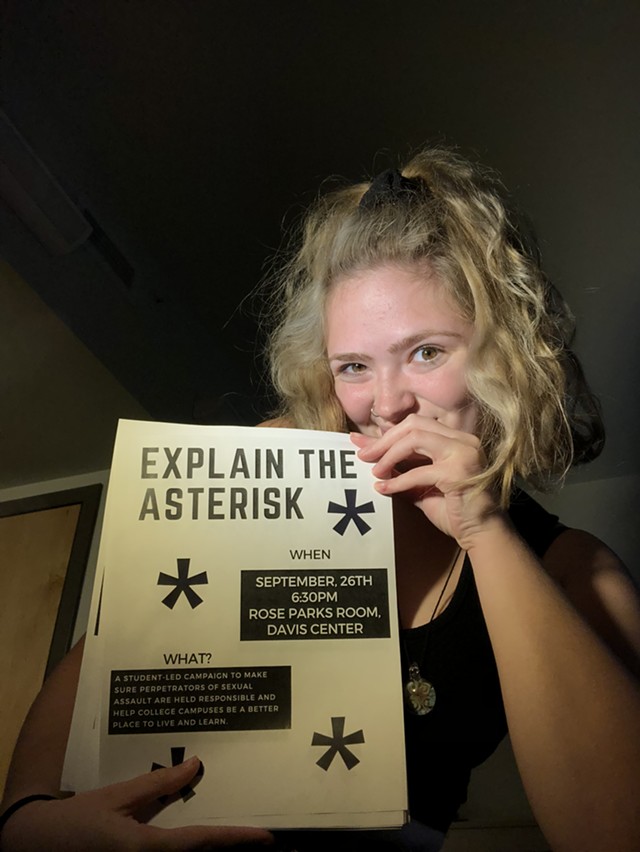A University of Vermont sophomore is leading a national effort to require that colleges disclose on transcripts when a student is suspended or expelled for sexual misconduct.
More than 46,000 people have signed the Explain the Asterisk petition at
change.org. The title refers to a practice by some colleges of putting an asterisk on transcripts indicating misconduct — but not specifying what kind.
The campaign is a personal one for its leader, Syd Ovitt, who says she was raped by a fellow UVM student last year after they met on Tinder and started dating. She spoke to
Seven Days on Thursday, as the confirmation hearing of Supreme Court nominee Brett Kavanaugh galvanized the nation. Christine Blasey Ford testified that Kavanaugh sexually assaulted her while they were in high school.
Ovitt did not report her allegation to police, but did file a complaint with UVM a few months after the incident. She launched the campaign in April, while her sexual assault complaint was being reviewed under UVM's judicial process. That carries no criminal sanctions but can result in discipline up to expulsion.
At the time, Ovitt said, she thought the student would be found guilty and possibly be expelled, only to then transfer and repeat the behavior at another school. UVM transcripts disclose suspension or dismissal for academic dishonesty or performance, but not for misconduct, sexual or otherwise.
Under Ovitt's proposal, which calls for a federal law mandating disclosure, "It would be on the transcript so it would be something that is known," Ovitt said.
In June, UVM notified Ovitt that the student she accused was found not guilty in the university's review process. Ovitt says she was devastated. He remains at UVM. “I still see him sometimes and it's one of the worst things that ever happens to me," Ovitt said. "It's terrible.”
The student hired an attorney who questioned every part of her version of events, Ovitt said, which included her statement that the young man plied her with alcohol before putting a pillow over her face and raping her.
“I was drunk when it happened and they kind of used that as discrediting for everything I said,” Ovitt said.
The issue is bigger than just her situation, she said. The mandate would make it a lot harder for someone to "hop around" from school to school and repeat sexual misdeeds.
“I might be able to help people and prevent [students] from being sexually assaulted,’’ Ovitt said.
The response at UVM has been positive. Her story appeared on the front page of the student newspaper, the
Cynic. This week, Ovitt organized a meeting at the Davis Center to talk about the campaign, and 50 people attended. The fact that the meeting was held while the coverage of Blasey Ford's accusations against Kavanaugh dominated the news media made it all the more powerful, Ovitt said.
“I stand by believing people who come forward. Even the fact that [Kavanaugh] was accused once should have been enough for him not to be confirmed as a Supreme Court justice,” Ovitt said, let alone the fact that two other women accused him of sexual misdeeds.
Congress considered, but didn't pass, a similar measure a few years ago. Critics raised concern about due process, noting that colleges' judicial findings don't necessarily afford the accused the same rights to defend themselves as are granted in a criminal court of law. Yet disclosing findings on transcripts could turn them into unofficial sex offender registries.
Critics of full disclosure also point to successful lawsuits by some students who have convinced judges that their rights to a fair defense were denied in campus adjudications that had damaging consequences.
Victims meanwhile, have reached out to Ovitt with tales of damaging consequences of their own. Ovitt said most of the comments she's received are overwhelmingly supportive. She's contacted Vermont's congressional delegation to push forward a federal law and various state lawmakers to lobby for a state law. A few states already have one.
UVM is not joining the campaign.
"Our practice has been to view the student transcript as a strictly academic record that reflects the student’s academic performance," UVM communications director Enrique Corredera told
Seven Days via email.
"We will continue monitoring changes as part of this national conversation and, as always, we want to ensure that we follow best practices."
He declined to discuss Ovitt's complaint.
"We are not at liberty to discuss individual cases," he wrote. "However, the University remains committed to eliminating, preventing, and addressing the effects of sexual harassment and misconduct, and to providing a fair and impartial process for investigation and adjudication of reported incidents."











Comments (4)
Showing 1-4 of 4
Comments are closed.
From 2014-2020, Seven Days allowed readers to comment on all stories posted on our website. While we've appreciated the suggestions and insights, right now Seven Days is prioritizing our core mission — producing high-quality, responsible local journalism — over moderating online debates between readers.
To criticize, correct or praise our reporting, please send us a letter to the editor or send us a tip. We’ll check it out and report the results.
Online comments may return when we have better tech tools for managing them. Thanks for reading.